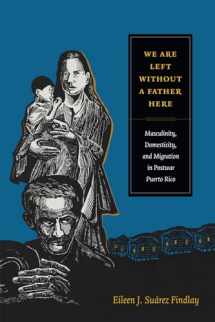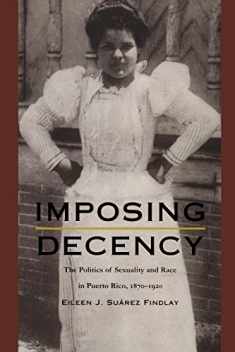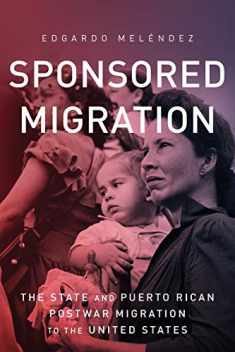
We Are Left without a Father Here: Masculinity, Domesticity, and Migration in Postwar Puerto Rico (American Encounters/Global Interactions)
ISBN-13:
9780822357827
ISBN-10:
0822357828
Edition:
Illustrated
Author:
Eileen J. Suárez Findlay
Publication date:
2014
Publisher:
Duke University Press Books
Format:
Paperback
312 pages
Category:
Caribbean & West Indies
,
Americas History
,
State & Local
,
United States History
FREE US shipping
Book details
ISBN-13:
9780822357827
ISBN-10:
0822357828
Edition:
Illustrated
Author:
Eileen J. Suárez Findlay
Publication date:
2014
Publisher:
Duke University Press Books
Format:
Paperback
312 pages
Category:
Caribbean & West Indies
,
Americas History
,
State & Local
,
United States History
Summary
We Are Left without a Father Here: Masculinity, Domesticity, and Migration in Postwar Puerto Rico (American Encounters/Global Interactions) (ISBN-13: 9780822357827 and ISBN-10: 0822357828), written by authors
Eileen J. Suárez Findlay, was published by Duke University Press Books in 2014.
With an overall rating of 3.5 stars, it's a notable title among other
Caribbean & West Indies
(Americas History, State & Local, United States History) books. You can easily purchase or rent We Are Left without a Father Here: Masculinity, Domesticity, and Migration in Postwar Puerto Rico (American Encounters/Global Interactions) (Paperback) from BooksRun,
along with many other new and used
Caribbean & West Indies
books
and textbooks.
And, if you're looking to sell your copy, our current buyback offer is $0.93.
Description
We Are Left without a Father Here is a transnational history of working people's struggles and a gendered analysis of populism and colonialism in mid-twentieth-century Puerto Rico. At its core are the thousands of agricultural workers who, at the behest of the Puerto Rican government, migrated to Michigan in 1950 to work in the state's sugar beet fields. The men expected to earn enough income to finally become successful breadwinners and fathers. To their dismay, the men encountered abysmal working conditions and pay. The migrant workers in Michigan and their wives in Puerto Rico soon exploded in protest. Chronicling the protests, the surprising alliances that they created, and the Puerto Rican government's response, Eileen J. Suárez Findlay explains that notions of fatherhood and domesticity were central to Puerto Rican populist politics. Patriarchal ideals shaped citizens' understandings of themselves, their relationship to Puerto Rican leaders and the state, as well as the meanings they ascribed to U.S. colonialism. Findlay argues that the motivations and strategies for transnational labor migrations, colonial policies, and worker solidarities are all deeply gendered.


We would LOVE it if you could help us and other readers by reviewing the book
Book review

Congratulations! We have received your book review.
{user}
{createdAt}
by {truncated_author}




